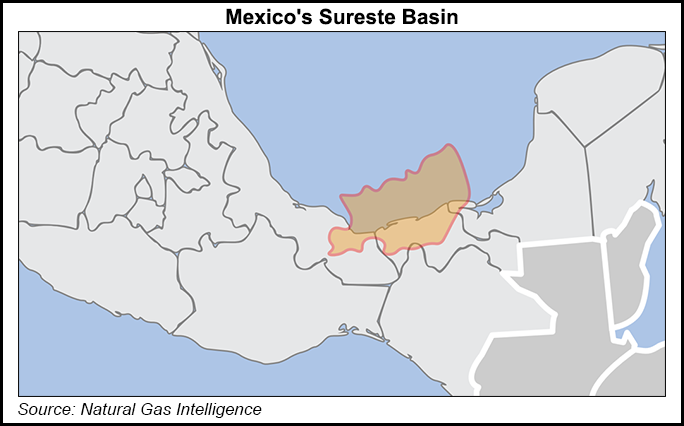E&P | NGI All News Access | NGI Mexico GPI | NGI The Weekly Gas Market Report
Premier Oil Sees Mexico’s Zama Appraisal Campaign Concluding This Year
Premier Oil plc said it expects results shortly from the Zama-2 appraisal well, which was spudded last November in Mexico’s Sureste Basin.

The well targets the shallow water Zama discovery made in 2017, estimated to hold 400-800 million boe of recoverable reserves. Development is led by a consortium comprised of UK-based Premier, Houston-based Talos Energy Inc. and Sierra Oil & Gas, which is backed by Riverstone Energy Ltd.
The Zama-2 well, drilled to the north of the Zama discovery, “has encountered the main Zama reservoir and is currently drilling ahead as planned,” Premier said earlier this month. The well then is to be deepened to test the Marte prospect, which holds unrisked recoverable resources estimated at 60-150 million boe.
“The rig will then move to drill the Zama-3 appraisal well, to the south, which will complete the Block 7 Zama appraisal program, expected during the third quarter,” Premier said.
Block 7, the exploration block containing Zama, was awarded to the consortium in 2015 in Mexico’s inaugural Round 1.1 bidding process, the first to be conducted under the framework of the 2013 constitutional energy reform.
Premier said a 3-D seismic acquisition across Block 30, in which it secured a 30% stake via Mexico’s Round 3.1 last March, is set to begin in the second quarter. The block contains the “high impact Wahoo and Cabrilla prospects,” the company noted.
Round 3.1 for shallow water blocks appears to have been the final bid round held in Mexico, at least for the next three years. After taking office Dec. 1, President Andrés Manuel López Obrador canceled onshore bid rounds 3.2 and 3.3 for conventional and unconventional gas-rich blocks, mainly in the Burgos Basin.
“The rounds that were geared toward gas opportunities received more interest than analysts expected at the outset,” Pulso Energético’s Pablo Zarate, information director for the think tank, told NGI. That may explain why “a number of different investors believe that there are ways to produce gas in Mexico at profitable levels.”
The administration has alleged that the bid rounds and energy reform have not delivered on the previous government’s promise of attracting investment and reversing a nearly 15-year decline in oil and gas production.
When López Obrador announced the three-year hiatus to the bid rounds, Germany’s DEA Deutsche Erdoel AG said it signed an agreement to acquire Sierra, which holds interests in about 9,400 square kilometers (3,629 square miles) of exploration acreage in the Sureste basin.
Talos in October also contracted with Pan American Energy LLC to expedite developing its offshore Mexico acreage. Italy’s Eni SpA and Russia’s Lukoil announced a similar deal in November.
In September, the Block 7 consortium and national oil company Petróleos Mexicanos (Pemex) announced a pre-unitization agreement pertaining to Block 7 and Pemex’s adjacent Amoca-Yaxche-03 block, under which the two parties agreed to share information. Unitization, as it is done by U.S. operators, basically merges all of the oil and gas leases into one contract.
The agreement also set “a clear path for the signing of a unit agreement and unit operating agreement in the event a shared reservoir is confirmed,” Talos said at the time.
Meanwhile, in what may be a sign of expanded exploration, Mexico’s rig count doubled year/year to 31 in December, according to data by Baker Hughes, a GE Company.
© 2024 Natural Gas Intelligence. All rights reserved.
ISSN © 2577-9877 | ISSN © 2577-9966 | ISSN © 1532-1266 | ISSN © 2158-8023 |
